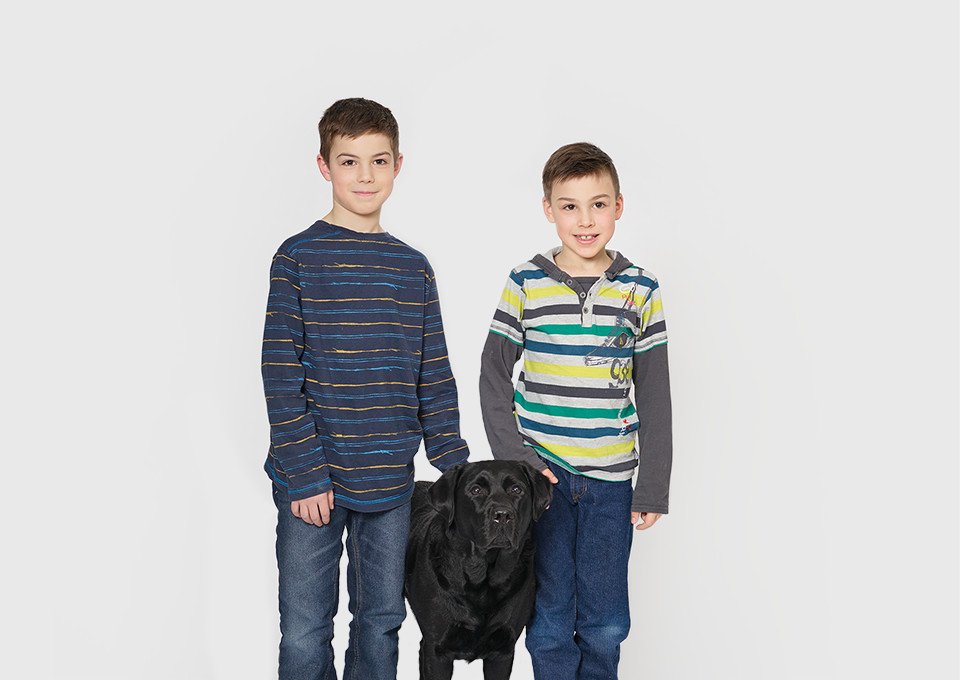

Providing a Companion for a Youth with ASD
The Mira Foundation program provides service dogs for young people with an Autism Spectrum Disorder (ASD).
Learn about what impact a service dog can have on the development of a young person with ASD, and the program’s admission criteria.
What is the service dog program for youth with ASD?
The Mira Schola program was launched in 2010 to help the families of children with ASD.
Studies conducted by the Mira Foundation have shown that service dogs provide many benefits for young people with ASD and their families, both physically and mentally.
More specifically, they help to reduce stress and anxiety and improve the quality of sleep, language skills and socialization.
Our program has the following objectives:
- Help young persons with ASD come out of their shells and reach maximum autonomy.
- Equip and support the parents and relatives of youth with ASD.
- Engage in research to advance knowledge and practices relating to developmental disorders.
What are the admission criteria for the service dog program for youth with ASD?
The youth with ASD must :
- Be between 5 and 21 years old;
- Showing an interest in dogs;
- Have significant needs at home and when going out, i.e. needs that cannot be met by a companion dog;
- Demonstrate certain skills related to the management of a dog or have the potential to acquire the required skills;
- Be a resident of Canada.
To submit your application, you need to :
- Provide a recent ASD diagnosis evaluation report issued by a professional;
- Certify the absence of dog allergies in the family
- Certify that no other dog lives in the home at the time of the assignment;
- Be sure to never leave the dog alone and always include it in daily activities (including at work of the parent in charge);
- Provide consent to participate from the legal parents (in case of absence of a second parent, proof must be provided);
- Be able to assume the annual costs required to maintain and care for the service dog (estimated at more than $2500/year by the AMVQ).

Program sequence
Evaluation
The program is available for youth with an ASD, aged 21 and under. The attribution of a service dog requires increased involvement of the young beneficiary’s parents.
After having analyzed the request, we hold an evaluation meeting at our offices to determine the youth’s eligibility. This meeting aims to better identify the youth’s needs, evaluate and assess the intended use of the service dog and its level of attraction to the dog.
Training
According to the program’s time frame, the designated parent is invited to take a 9-days course with their child at our facilities.The frequency of participation may vary depending on the age of the beneficiary.
The class has 8 people. It focuses on dog handling and requires the parent’s involvement 24 hours a day. Following the assignment class, the accompanying parent(s) must be able to bring the dog into their daily activities for the first few months until their child acquires greater autonomy with the dog.This period is an adaptation period for the youth to consolidate his or her dog management skills and abilities. Also note that in separated families, when parents have shared custody or if one parent has custody, the participation of both parents in the training course is required.
Mira provides accommodation and 3 meals a day free of charge to the beneficiaries and accompanying parent(s) for the duration of their stay.
Follow-up
At the end of the stay, a Mira Schola program coach will follow up at the beneficiary’s home to ensure the service dog’s optimal integration in the family environment.
However, it will be your responsibility to maintain what the dog has learned.
Application
It is currently not possible to submit an application for the service dog program for youth with ASD. Please note that there are only a limited number of openings, depending on our operational needs. Keep in mind that the time between opening waves is variable. Once all previously submitted applications have been processed, we will be able to reopen the link to submit an application for the program. We encourage you to check our website frequently, as the link to apply will be available here. We thank you for your interest!
Testimonials
A video of a young girl that has a dog from the Mira program for young child with TSA.
